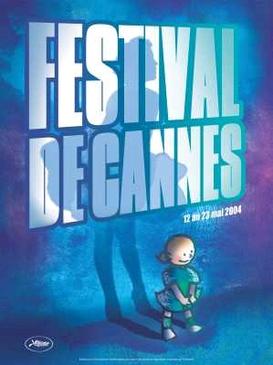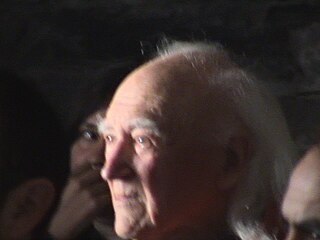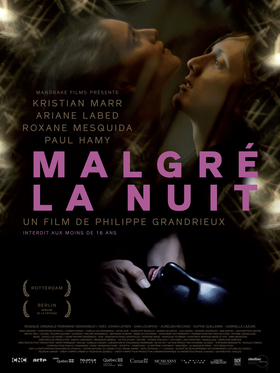Life and career
Grandrieux was born in Saint-Étienne. [1] He studied film at the INSAS (Institut National Supérieur des Arts du Spectacle) in Belgium. He exhibited his first video work at Galerie Albert Baronian in Brussels.
In the 1980s, he worked in collaboration with the French Institut national de l'audiovisuel (INA) and the television channel La Sept/Arte where he helped develop new cinematographic forms and formats that challenged basic principles of film writing, for instance, the conventions behind documentary, information and film essays. In 1990, he created the film research lab “Live” which produced one-hour-long sequences by Thierry Kuntzel, Robert Kramer and Robert Frank.
Since 2005, programs devoted to Grandrieux's features (including Sombre, La Vie nouvelle, Un lac, and Malgré la nuit), installations, documentary work and shorts have been presented across the world.
In 2012 and 2013, Grandrieux was a visiting professor of fiction film at Harvard University.
In 2022, Philippe Grandrieux wrote Marcus (Emperor Mark Aurelius), the screenplay for his next feature film, in collaboration with Jonathan Littell.
The premiere of his staging of the opera Tristan and Isolde took place in March 2023 at Opera Ballet Vlaanderen in Ghent and Antwerp, and will be performed at Opera de Rouen [2] in June 2024.
Work
Grandrieux's work covers several cinematographic fields – TV experimentation, video art, research movie, film essay, documentary and museum exhibition. His full-feature movies, Sombre (Special Jury Prize at the Locarno Film Festival), La Vie Nouvelle (A New Life), Un Lac (Orizzonti - Special Jury Prize in Venice) and Malgré la nuit, are examples of Grandrieux's creativity in photography, sound and narration. Grandrieux's films, give the viewer intense sensorial experiences. His goal is to make the viewer psychologically involved in his movies. Its films express a world of energies based on sensations and affects despite a linear narration and an iconography that relies on archetypes that refer to the archaic images of the fairy tale and the legend. Tim Palmer situates Grandrieux's work within an ongoing tendency of a cinema of the body. [3]
For the soundtrack, he worked with Alan Vega (on Sombre), with the musicians, poets and performers of the band Étant donnés (groupe) [ fr ] (on A New Life) and with Ferdinand Grandrieux (on Malgré la nuit).
Publication: "La Vie nouvelle/nouvelle Vision, à propos d'un film de Philippe Grandrieux," under the direction of Nicole Brenez, Paris, Ed. Léo Scheer, février 2005. With texts from – Jonathan Rosenbaum, Raymond Bellour, Nicole Brenez, Sothean Nhieim, Fabien Gaffez, Serge Kaganski, Augustin Gimel, Lionel Soukaz, Adrian Martin, Vincent Amiel, Peter Tscherkassky... This book including a DVD of La Vie nouvelle. [4]
In 2008, the Tate Modern of London, along the retrospective "Paradise Now ! Essential French Avant-Garde cinema 1890-2008," played Putting Holes in Happiness, A New Life, The Late Season and an excerpt of Un Lac (A Lake), his latest movie, which was not completed back then.
Un Lac was ready for the 65th Venice Film Festival (2008) where he won a Special Mention in the Orrizzonti Section which rewards movies that initiate new cinematographic trends. [5]
In 2011, his documentary It May Be That Beauty Has Strengthened Our Resolve - Masao Adachi (PG co-author of the project with Nicole Brenez) has been programmed in more than 35 festivals... and was awarded at: CPH:DOX Copenhagen International Documentary Film Festival / Denmark. The NEW:VISION AWARD that aims at promoting the experimental documentary in the field between documentary and art was given to Philippe Grandrieux's documentary about the Japanese filmmaker Masao Adachi. The jury highlighted the film's interweaving of Adachi's aesthetic concerns with the social and political histories he lived through. 'Rather than a typical director/subject relationship, this is a collaboration between both directors, where authorship moves back and forth,' the jury's motivation said." The film wins also in 2012 the Best Documentary Prize in Pantin, France and in 2013 the Best Documentary Prize - Cultural Resistance in Tripoli, Lebanon.
In 2011, Philippe Grandrieux undertakes the production of a trilogy (film and performances with dancers) on the theme of bare life, in reference to the concept of Giorgio Agamben. In 2012 White Epilepsy and/or Meurtrière and/or Unrest has been programmed at FID Marseille, Underdox Munich, FNC Montreal. In 2013 at the IFFR Rotterdam, Lincoln Center New York, Ficunam Mexico then Istanbul, Lima, Edinburgh, Wroclaw... Between 2012 and 2016 this work (films and performances) is presented at: Beaubourg Metz Museum, Whitney Museum of American Art, CCN Le Havre, ICI-CCN Montpellier, Chicago University as well at the Radcliffe Institute for Advanced Study - Harvard University.
In 2019 The Empty Gallery/Hong Kong presents all of this research, White Epilepsy, Meurtrière and Unrest, with a new piece The Scream produced and installed for this occasion and consisting of eleven projections.
Awards
1998 Sombre (fiction 1h52')
- Festival de Locarno: Special Mention of the jury
2009 Un lac (fiction 1h30')
- 65th Mostra of Venice Orizzonti: Special Mention of the jury
2009 Un lac (fiction 1h30')
International Film Festival of Las Palmas:
- Best Photography + Special Mention for Innovation
2016 Meurtrière (film 59' and performance - with dancers)
- Festival du nouveau cinéma de Montréal: Prix FNC LAB
- Festival FilMadrid: Mention spéciale du jury
2011 It May Be That Beauty Has Strengthened Our Resolve - Masao Adachi (documentary 74')
- CPH:DOX Copenhagen Documentary Film Festival, Danemark: « New: Vision Award » (2011)
- Festival Côté Court, Pantin: Grand Prix Expérimental (2012)
- Festival de Tripoli, Liban: Grand Prix du documentaire « Cultural Resistance » (2013)
1983 Juste une Image (about the new images - 9 x 55’)
co-author with Louisette Neil and Thierry Garrel
- Grand Prix Scam
1983 Pleine Lune (soirée thématique 180’)
co-author with Jérôme Prieur and Thierry Kuntzel
- Prix de l’Association française des critiques de télévision









